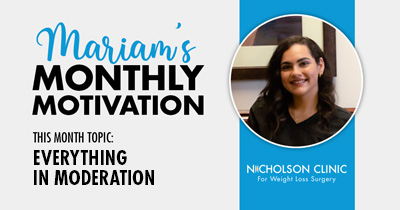
Hello everyone and welcome to my second blog post! If you don’t know who I am, let me introduce myself. My name is Mariam and I am a patient educator here at Nicholson Clinic. I am also a weight loss surgery patient myself, currently 10 months post-op VSG. This month’s topic is, “Everything in Moderation” and I am very excited to talk about this one.
The first thing I want to talk about is restriction and how it can be both good and bad. The surgery itself is restrictive in nature. If you had the sleeve, your stomach size and capacity is restricted and with the bypass, your intestinal tract is rerouted thereby restricting your nutrition intake. In this sense, the restriction is good allowing patients a chance to lose weight that they tried so hard to lose for years. Where restriction can become an issue is habits developed after surgery. I always tell patients when they ask what my motto is in regards to weight loss and that is, I aim to eat more high-quality foods. Notice how I aim to add more food rather than focus on taking out any foods.
Imagine this, you make a reasonable income and 95 percent of the time, you’re very smart with your money. You drive a sensible car with good gas mileage, own a humble home, etc., but you never treat yourself. You never let yourself spend money on something that would be beneficial to your mental health like an occasional spa day, going out to eat with friends, or getting that six dollar Starbucks coffee you want because you’re trying to save money (or stay on track in regards to weight loss). Does that sound very enjoyable let alone sustainable?
I stopped dieting when I chose to have this surgery and changed my mindset into one where this became a lifestyle change, not something temporary. In that sense, I knew that if I was going to be consistent with this new way of eating and living, it would have to be realistic for me. So, if I wanted to eat out with my friends every once in a while, or try the new snack that came out, I was going to. But I wouldn’t let that get me off track or make it a habit.
Where I see most people going wrong is that they let that treat snowball. So, in the last scenario, if the person continuously made high dollar purchases, would he still have all that money? No, his money would go down just like a patient who chose to continuously eat high calorie foods weight would go up.
It may be a silly scenario, but I really hope you all understand what I’m trying to get at in that it is okay to have an occasional treat. It is not okay, on the other hand, to make it common habit. This is something I have to keep in mind on my own journey because I know that if I continuously tell myself, “No, you can’t have that one cookie, you’re on a diet” that I’ll end up eating four later due to creating that extreme restriction.
So, that is fine advice and all but how do you make it common practice and incorporate it into your lifestyle? The first thing is taking “good” and “bad” labels off food. There is no good or bad food. All food serves a purpose to your body, one type is just more nourishing.
I knew that with a smaller stomach capacity, I would really have to maximize every bite and prioritize certain food groups like proteins. Bread, for example, swells in the stomach and makes me very full to where I can’t get in enough protein or vegetables. Does that mean bread or carbs in general are bad or that I will never eat it again? Absolutely not, multigrain bread or complex carbs are necessary in a rounded diet, just in smaller amounts to allow you to prioritize your protein intake.
My biggest takeaway is that weight loss is about what you do 95 percent of the time. Working out once won’t make you “skinny” in the same way that one bad meal won’t make you “fat.” And if you get off track, just know it happens to the best of us, it definitely did for me. All you can do is get right back to it. Add more nutritious meals to your diet and remember your goal. You’ve got this and don’t forget, everything in moderation!












